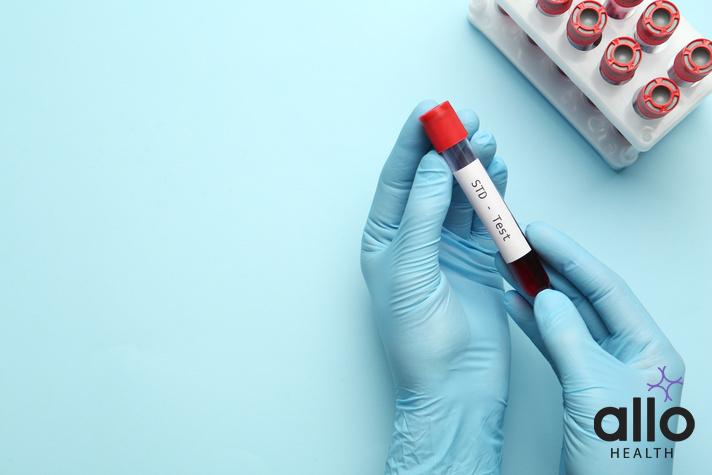STD Testing Services in India

Allo Health is dedicated to personalized well-being, offering support and trusted information tailored to individual health goals. The platform emphasizes human-generated content, led by a distinguished medical team of experts, including physicians and sexual health specialists. Their commitment to credibility involves rigorous fact-checking, authoritative research, and continuous updates to ensure accurate, up-to-date information. Allo Health's unique approach goes beyond conventional platforms, providing expert-led insights and a continuous commitment to excellence, with user feedback playing a crucial role in shaping the platform's authoritative voice.

Dr. Aditi completed her undergraduate medical education at AJIMS, Mangalore, after which she worked in multi-speciality hospitals with COVID patients and in the Pain and Palliative medicine department. Driven by her experiences, she developed a keen interest in psychiatry. Dr. Aditi believes that mental health is just as, if not more important, than physical health.
Why This Was Upated?
Our experts continually monitor the health and wellness space, and we update our articles when new information became available.
Updated on 08 May, 2024
- Article was updated as part of our commitment to diversity, equity, and inclusion.

"The following blog article provides general information and insights on various topics. However, it is important to note that the information presented is not intended as professional advice in any specific field or area. The content of this blog is for general educational and informational purposes only.
Book consultation
The content should not be interpreted as endorsement, recommendation, or guarantee of any product, service, or information mentioned. Readers are solely responsible for the decisions and actions they take based on the information provided in this blog. It is essential to exercise individual judgment, critical thinking, and personal responsibility when applying or implementing any information or suggestions discussed in the blog."
Sexually transmitted diseases (STDs) are a significant public health concern worldwide, including in India. With the rise in sexual activity and the escalation of disease, access to reliable STD testing services is crucial for preventing the spread of infections and safeguarding individuals’ long-term sexual health. This article aims to provide a comprehensive overview of STD testing services available in India, covering various aspects such as types of tests, risk factors, testing locations, and the importance of regular testing.
What is STD?
STDs, or sexually transmitted diseases, are infections spread through sexual activity or personal contact with infected fluids. Common types include:
- HIV/AIDS: Transmitted through sexual contact, blood, or from mother to child during pregnancy, this virus weakens the immune system.
- Genital Herpes: Caused by the herpes simplex virus (HSV), it leads to painful sores on the genitals or mouth.
- Chlamydia and Gonorrhea: Bacterial infections affecting the genital tract, often asymptomatic but can cause complications if untreated.
- Syphilis: Caused by the bacterium Treponema pallidum, it progresses through stages and can lead to serious health complications if not treated.
- HPV: Human papillomavirus infection can lead to genital warts or cervical cancer.
- Hepatitis B and C: Viral infections affecting the liver, transmitted through blood or sexual contact.
Regular testing is crucial, especially for those with multiple sexual partners or engaging in unprotected sex, to detect infections early and prevent transmission to sexual partners.
STD Testing and It’s Types
STD testing involves various methods to detect sexually transmitted infections (STIs) in individuals who may be at risk due to sexual activity, contact with infected fluids, or other risk factors.
Types of STD Tests:
- Blood Tests: These tests detect antibodies or antigens in the blood to diagnose infections such as HIV, syphilis, or hepatitis B virus (HBV). They are crucial for identifying current or past infections and assessing antibiotic susceptibility.
- Urine Tests: Urine samples are collected to screen for infections like chlamydia and gonorrhea. This non-invasive method is convenient and effective, especially for asymptomatic individuals.
- Swab Tests: Swabs of the genital area, throat, or mouth are used to collect samples for testing infections like genital herpes (via genital swab) or chlamydia (via oral swab). These tests are vital for diagnosing infections in specific locations.
- At-Home STI Tests: Individuals can collect samples at home using convenient testing kits and send them to a lab for analysis. These kits offer privacy and convenience, making them suitable for those who prefer discreet testing options.
Each type of test serves a unique purpose in diagnosing and monitoring STIs, providing critical indicators for effective treatment and prevention strategies. Regular testing is essential, particularly for sexually active individuals, pregnant women, and those with multiple partners, to ensure early detection and timely intervention in case of infection.
Importance of Regular STD Testing

Regular STD testing is crucial for several reasons:
- Early Detection of Infections: Regular testing helps in the early detection of STDs such as HIV, syphilis, and chlamydia, allowing for prompt treatment and preventing the escalation of disease. This is particularly important for pregnant women to prevent mother-to-child transmission.
- Protecting Sexual Partners: Individuals who are sexually active or have multiple sex partners are at higher risk for infections. Regular testing ensures that individuals are aware of their STD status, reducing the risk of transmitting infections to their partners.
- Peace of Mind: Knowing one’s STD status provides peace of mind and alleviates anxiety about potential health risks. It allows individuals to enjoy sexual activity without worrying about the possibility of having an undetected infection.
- Maintaining Long-Term Sexual Health: Regular testing is essential for maintaining long-term sexual health, especially for those in monogamous relationships or planning to start a family. It ensures that individuals can enter future relationships confidently and responsibly.
- Preventing Health Complications: Untreated STDs can lead to severe health complications such as cervical cancer, infertility, and congenital syphilis. Regular testing helps in preventing these complications by diagnosing infections early and initiating appropriate treatment.
Regular STD testing is essential for protecting oneself and others, maintaining overall health and well-being, and promoting responsible sexual behavior.
Different STD Testing Services in India

In India, various STD testing services cater to different needs and preferences:
- Public Health Clinics: Government-run health centers across India offer STD testing services, providing free or low-cost tests for common infections like HIV, syphilis, and hepatitis. These centers are accessible to millions of people and often provide comprehensive health screens, including cervical cancer screening for women.
- Private Providers: Private testing centers and healthcare professionals offer confidential testing services for individuals seeking discretion and convenience. These facilities may utilize rapid testing methods, providing results within days after exposure, and may offer a panel of tests covering a range of infections.
- Online Testing Kits: Companies provide at-home STD testing kits that allow individuals to collect samples in the privacy of their homes and send them to labs for analysis. These convenient test options are cost-effective and efficient, providing peace of mind to those concerned about their sexual health.
- Specialized Clinics: Some clinics specialize in STD testing and treatment, offering additional testing options such as antibody testing and etiologic testing for specific infections like genital herpes and HPV.
By offering a range of testing options, India’s STD testing services cater to diverse populations, promoting regular testing and ensuring effective screening for sexually transmitted infections.
Cost of STD Testing Services in India
In India, the cost of STD (Sexually Transmitted Diseases) testing services can vary widely depending on the type of test, location, and whether it’s done in a government or private healthcare facility.
- Government Facilities: Most government hospitals and health centers offer STD testing at minimal or no cost. They provide basic testing services for common STDs.
- Private Hospitals and Labs: The cost in private settings can range from INR 500 to INR 5,000 or more, depending on the sophistication of the test (e.g., PCR tests tend to be more expensive than antibody tests).
- Comprehensive STD Panels: These can cost upwards of INR 1,500 to INR 4,000 in private labs and include tests for a range of STDs like HIV, herpes, chlamydia, gonorrhea, and syphilis.
- Home Testing Kits: Available for some STDs, these kits range from INR 600 to INR 1,500 but may require confirmation from a healthcare provider.
- Free Testing: NGOs and some government initiatives offer free testing and counseling services, especially for high-risk populations and during public health campaigns.
It’s important to check with specific healthcare providers for the most accurate and up-to-date pricing.
Government Benefits for STD Testing in India
- Free or Low-Cost Testing: Government-run public health clinics across India offer STD testing services at minimal or no cost, making them accessible to millions of people, especially those at higher risk due to multiple sexual partners or frequent sexual activity.
- Confidentiality and Privacy: Government-provided STD testing services prioritize confidentiality, ensuring individuals’ privacy regarding their test results and health status. This encourages more people, including pregnant women and adolescents, to seek testing without fear of stigma or discrimination.
- Comprehensive Screening Programs: Public health initiatives include comprehensive screening programs that cover a range of infections, including HIV, syphilis, hepatitis, and common STIs like chlamydia and gonorrhea. These programs use a variety of testing methods, such as rapid blood tests and swab tests, to maximize test indicators and ensure accurate diagnosis.
- Access to Treatment: In addition to testing, government health centers offer access to treatment and counseling services for individuals diagnosed with STDs. This includes antibiotic susceptibility testing and appropriate medication for infections like chlamydia, gonorrhea, and syphilis, ensuring effective management of infections and preventing complications.
- Maternal and Child Health Programs: Specialized programs focus on preventing mother-to-child transmission of STDs, such as congenital syphilis and maternal HIV infection. Pregnant women receive complete STD screening as part of prenatal care, promoting healthy pregnancies and reducing the risk of infant infections.
Conclusion
Access to comprehensive STD testing services is essential for promoting sexual health and preventing the spread of infections in India. By understanding the importance of regular testing, individuals can take proactive steps to protect themselves and their partners. Whether through public health clinics, private providers, or at-home testing kits, everyone should prioritize their sexual health by getting tested regularly. Remember, early detection is key to maintaining a healthy and fulfilling sex life.
STD testing services play a critical role in ensuring a healthy population and reducing the burden of preventable diseases. Let’s prioritize regular testing and empower individuals to take control of their sexual health for a brighter, safer future.
Most Asked Questions
-
What are STDs and why is testing important?
STDs are infections passed from one person to another through sexual activity or personal contact with infected fluids. Testing is crucial because it helps detect infections early, prevent their spread to sexual partners, and avoid long-term health problems.
-
How can I get tested for STDs in India?
You can get tested at public health clinics, private providers, or even order at-home testing kits online. Public clinics offer low-cost or free testing, while private providers ensure confidentiality for a fee. At-home testing kits provide convenience and privacy.
-
Who should consider getting tested for STDs?
Anyone who is sexually active, has multiple partners, or engages in unprotected sex should consider getting tested regularly. Pregnant women should also undergo routine STD testing to protect their health and that of their baby.
-
What are the benefits of STD testing services?
Early detection through testing allows for prompt treatment, preventing the spread of infections to others. Knowing your STD status provides peace of mind and empowers you to make informed decisions about your sexual health and future relationships. Regular testing promotes overall sexual health and wellbeing.






































